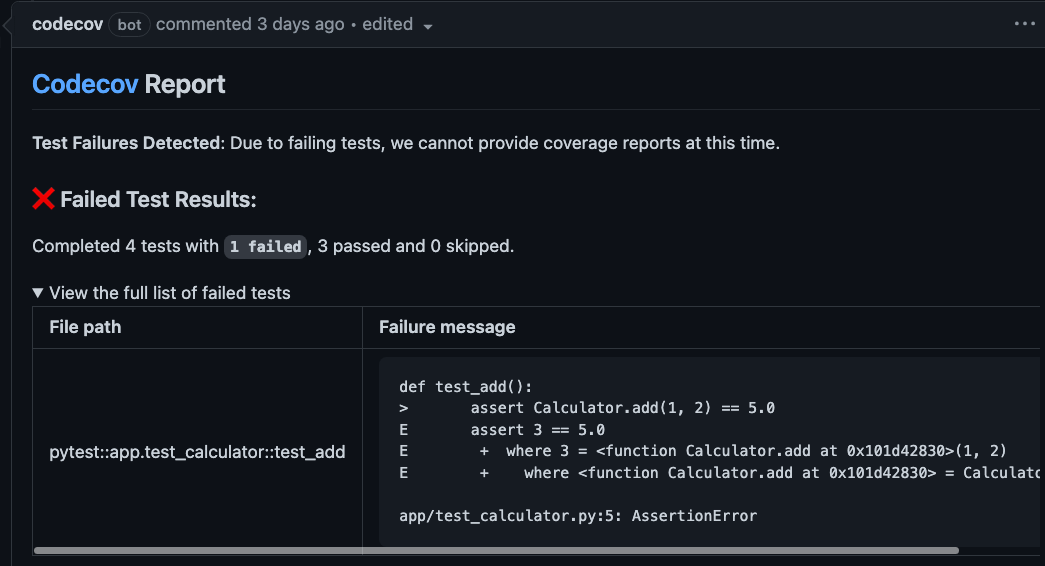[Beta] Test Analytics
Test Result Ingestion is currently in Beta.
Test Analytics is a new set of features from Codecov that provides insights into the health of your test framework. It is currently comprised of
- Test Result Ingestion (pre-requisite)
- Failed Test Reporting
Failed Test Reporting
Codecov can report on any failed test runs that could impact coverage. Here's how to set this up.
Prerequisite
- You're already set up with Codecov and are using the Codecov CLI to upload coverage reports to Codecov. Not doing this currently? Here's how to get set up with the Codecov CLI
- You're set up with a
CODECOV_TOKEN. - You're using a test runner that supports test results output in JUnit.
Set up using the action
1. Output a JUnit XML file in your CI
Here are some ways to generate JUnit XML when using the following common frameworks:
pytest --cov --junitxml=junit.xml
vitest --reporter=junit
npm i --save-dev jest-junit
jest --reporters=jest-junit
./vendor/bin/phpunit --log-junit junit.xml
The above snippets instruct the framework to generate a file (junit.xml) that contains the results of your test run.
2. Add the codecov/test-results-action to your CI
codecov/test-results-action to your CI- name: Upload test results to Codecov
if: ${{ !cancelled() }}
uses: codecov/test-results-action@v1
with:
token: ${{ secrets.CODECOV_TOKEN }}
This action will download the Codecov CLI, and upload the junit.xml file generated in the previous step to Codecov.
Your final ci.yml for a project using pytest could look something like this:
jobs:
unit-test:
name: Run unit tests
runs-on: ubuntu-latest
steps:
- name: Checkout
uses: actions/checkout@v4
with:
fetch-depth: 0
- name: Set up Python 3.11
uses: actions/setup-python@v3
with:
python-version: 3.11
- name: Install dependencies
run: |
python -m pip install --upgrade pip
pip install -r requirements.txt
- name: Test with pytest
run: |
pytest --cov --junitxml=junit.xml
- name: Upload coverage to Codecov
uses: codecov/codecov-action@v4
with:
token: ${{ secrets.CODECOV_TOKEN }}
- name: Upload test results to Codecov
if: ${{ !cancelled() }}
uses: codecov/test-results-action@v1
with:
token: ${{ secrets.CODECOV_TOKEN }}
Ensure you're always uploading coverage and test results to Codecov - even if tests fail
If tests fail, your CI may stop there and not execute the rest of your workflow.
If this is the case, to make sure test results are uploaded to Codecov, you will need to add some configuration so that your CI will run the steps to upload to Codecov, even in the case of test failures.
For Github Actions, there are a couple of ways to do this:
Set up by directly using the CLI
1. Install Codecov's CLI in your CI
Here's an example using pip
pip install codecov-cli
The CLI also offered as binaries compatible with other operating systems. For instructions, visit this page
2. Output a JUnit XML file
Codecov will need the output of your test run. If you’re building on Python, simply do the following when you’re calling pytest in your CI.
pytest <other_args> --junitxml=<report_name>.junit.xml
pytest --cov --junitxml=testreport.junit.xml // example
The above snippet instructs pytest to collect the result of all tests that are executed in this run and store as <report_name>.junit.xml. Be sure to replace <report_name> with your own filename
3. Upload this file to Codecov using the CLI
The following snippet instructs the CLI to to upload this report to Codecov.
codecovcli do-upload --report-type test_results --file <report_name>.junit.xml
Be sure to specify --report-type as test_results and include the file you created in Step 2. This will not necessarily upload coverage reports to Codecov.
4. Upload coverage to Codecov using the CLI
Codecov offers existing wrappers for the CLI (Github Actions, Circle CI Orb, Bitrise Step) that makes uploading coverage to Codecov easy, as described here.
If you're running a different CI, you can upload coverage as follows
codecovcli upload-process
This is also described here.
Go ahead and merge these changes in. In the next step we'll verify if things are working correctly.
Ensure you're always uploading coverage and test results to Codecov - even if tests fail
If tests fail, your CI may stop there and not execute the rest of your workflow.
If this is the case, to make sure test results are uploaded to Codecov, you will need to add some configuration so that your CI will run the steps to upload to Codecov, even in the case of test failures.
For Github Actions, there are a couple of ways to do this:
Verification
-
You can inspect the workflow logs to see if the call to Codecov succeeded. Specifically you're looking for

-
Any new PR comment with Coverage information will show the following message if Codecov has received a test report

-
After Codecov finds a failed test on a commit, you can see that the Codecov PR comment has changed

Troubleshooting
- Ensure your
CODECOV_TOKENis set - Ensure your coverage file is being generated.
- Ensure your tests result file is generated correctly and is in xml.
Updated about 1 month ago